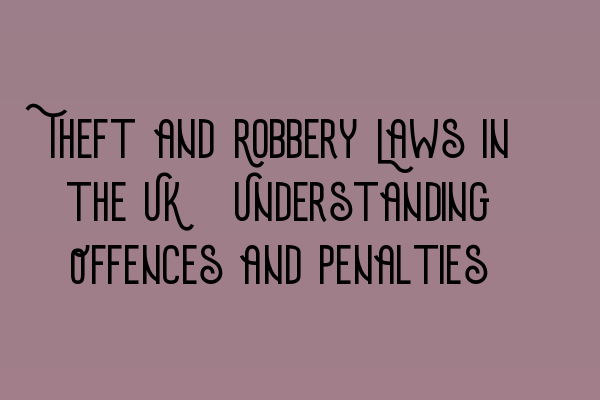Theft and Robbery Laws in the UK: Understanding Offences and Penalties
As seasoned criminal law practitioners at SQE Criminal Law & Practice Law UK, we understand the importance of comprehending the various offences and penalties related to theft and robbery in the United Kingdom. In this blog post, we will provide a comprehensive overview of these laws to help you understand your rights and obligations in the eyes of the law.
Theft Offences: An Overview
Theft is a serious criminal offence that involves taking someone else’s property without their permission and with the intent to permanently deprive them of it. Under the Theft Act 1968, theft is defined as the dishonest appropriation of property belonging to another with the intention of permanently depriving the other of it.
There are several key elements that must be proven in order to secure a conviction for theft:
- Dishonesty: The defendant’s actions must be deemed dishonest by the standards of ordinary, honest people.
- Appropriation: The defendant must assume control over the property in question.
- Belonging to Another: The property must belong to someone other than the defendant.
- Intention to Permanently Deprive: The defendant must have the intention to keep the property for themselves or dispose of it.
If convicted of theft, the penalties can vary depending on the severity of the offence. For less serious cases of theft, the defendant may face a fine or community service. However, for more serious cases, such as theft involving a high-value item or repeat offences, imprisonment may be imposed.
Robbery Offences: An Overview
Robbery is a more severe offence than theft and involves the use of force, threats, or coercion to steal another person’s property. It is considered a particularly grave offence due to the additional aspect of violence or intimidation.
Under the Theft Act 1968, the key elements that must be established to prove a charge of robbery include:
- Theft: The defendant must have stolen or attempted to steal property.
- Force or Threats: The defendant must have used force, or the threat of force, to commit the theft.
- Moment of Theft: The use of force or threats must occur at the time of the theft or immediately before or after it.
The penalties for robbery are significantly more severe than those for theft. If found guilty of robbery, a defendant can face a lengthy prison sentence. The exact duration of the sentence will depend on the circumstances of the case, including aggravating factors such as the use of weapons or causing grievous bodily harm.
Legal Assistance for Theft and Robbery Charges
If you find yourself facing charges related to theft or robbery, it is crucial to seek legal representation as soon as possible. At SQE Criminal Law & Practice Law UK, our experienced solicitors can provide expert advice and guidance throughout the legal process. Our team has a deep understanding of the intricacies of theft and robbery laws, allowing us to build strong defences and achieve the best possible outcomes for our clients.
To learn more about SQE 1 Practice Exam Questions, SQE 1 Practice Mocks FLK1 FLK2, SQE 2 Preparation Courses, SQE 1 Preparation Courses, and SRA SQE Exam Dates, please follow the respective links.
Contact us today for a consultation, and let our dedicated team of legal professionals fight for your rights and reputation.
